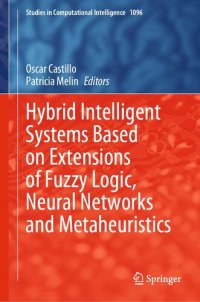
Ebook: Hybrid Intelligent Systems Based on Extensions of Fuzzy Logic, Neural Networks and Metaheuristics
Author: Oscar Castillo, Patricia Melin
- Genre: Computers // Algorithms and Data Structures: Pattern Recognition
- Series: Studies in Computational Intelligence
- Year: 2023
- Publisher: Springer Nature Switzerland
- Language: English
- epub
In this book, recent theoretical developments on fuzzy logic, neural networks and optimization algorithms, as well as their hybrid combinations, are presented. In addition, the above-mentioned methods are presented in application areas such as, intelligent control and robotics, pattern recognition, medical diagnosis, decision-making, time series prediction and optimization of complex problems. The book contains a collection of papers focused on hybrid intelligent systems based on soft computing techniques. There are a group of papers with the main theme of type-1 and type-2 fuzzy logic, which basically consists of papers that propose new concepts and algorithms based on type-1 and type-2 fuzzy logic and their applications. There also a group of papers that offer theoretical concepts and applications of meta-heuristics in different areas. Another group of papers outlines diverse applications of fuzzy logic, neural networks and hybrid intelligent systems in medical problems. There are also some papers that present theory and practice of neural networks in different application areas. In addition, there are papers that offer theory and practice of optimization and evolutionary algorithms in different application areas. Finally, there are a group of papers describing applications of fuzzy logic, neural networks and meta-heuristics in pattern recognition and classification problems.
The experiments were performed using the Python programming language. The TensorFlow framework and the Keras API are implemented in the generation and training of the models to analyze the impact of various image preprocessing techniques. The experiments were performed independently of each other for each of the previously defined filters. The experiments were carried out on a machine with the following specifications: an Intel core i7-11800H processor, 32 GB of DDR4 3200 MHz RAM, and an Nvidia RTX 3080 Laptop edition GPU with 16 GB of video memory running Ubuntu 20.04 LTS.
This section describes the experiments performed to obtain the solutions via the AutoML process using PSO as the optimization engine. Provided that PSO, as any other metaheuristic is a semi-stochastic method which depends on initial solutions and other factors, the AutoML solutions found may vary between different executions of this process. Because of this, the AutoML process is executed 10 times, to generate 10 different “optimal” solutions. After the AutoML process, the 10 solutions returned are compared with each other by performing 33 trials, each consisting in re-training and evaluating their performance in forecasting of the stock prices. This multi-trial evaluation is performed to provide statistical support to our final conclusions. To perform the AutoML process the PSO algorithm and the rest of the system was implemented using several Python libraries including NumPy, Pandas, Scikit-Learn and TensorFlow. The metaheuristic iteratively performs feature selection and design of the LSTM network with the objective of finding a configuration that minimizes the error of the network for the forecasting of the closing price of Google’s stocks.
The experiments were performed using the Python programming language. The TensorFlow framework and the Keras API are implemented in the generation and training of the models to analyze the impact of various image preprocessing techniques. The experiments were performed independently of each other for each of the previously defined filters. The experiments were carried out on a machine with the following specifications: an Intel core i7-11800H processor, 32 GB of DDR4 3200 MHz RAM, and an Nvidia RTX 3080 Laptop edition GPU with 16 GB of video memory running Ubuntu 20.04 LTS.
This section describes the experiments performed to obtain the solutions via the AutoML process using PSO as the optimization engine. Provided that PSO, as any other metaheuristic is a semi-stochastic method which depends on initial solutions and other factors, the AutoML solutions found may vary between different executions of this process. Because of this, the AutoML process is executed 10 times, to generate 10 different “optimal” solutions. After the AutoML process, the 10 solutions returned are compared with each other by performing 33 trials, each consisting in re-training and evaluating their performance in forecasting of the stock prices. This multi-trial evaluation is performed to provide statistical support to our final conclusions. To perform the AutoML process the PSO algorithm and the rest of the system was implemented using several Python libraries including NumPy, Pandas, Scikit-Learn and TensorFlow. The metaheuristic iteratively performs feature selection and design of the LSTM network with the objective of finding a configuration that minimizes the error of the network for the forecasting of the closing price of Google’s stocks.
Download the book Hybrid Intelligent Systems Based on Extensions of Fuzzy Logic, Neural Networks and Metaheuristics for free or read online
Continue reading on any device:

Last viewed books
Related books
{related-news}
Comments (0)